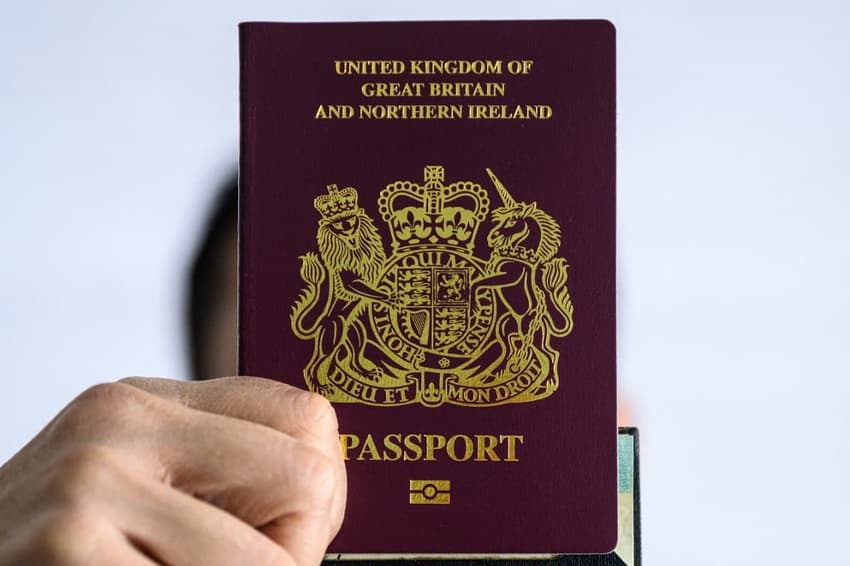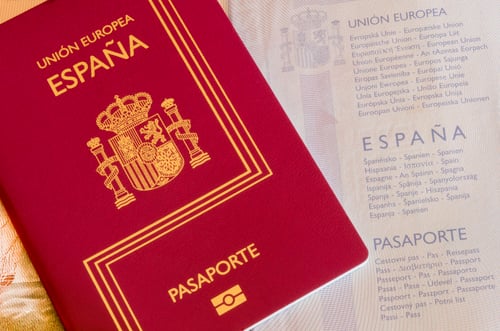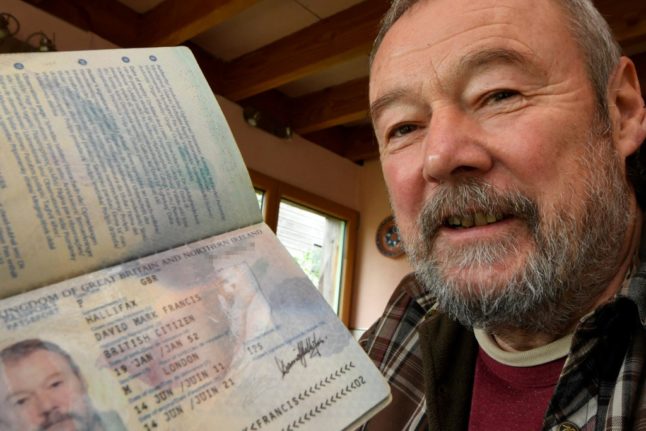Brexit: Do I really have to give up my British passport to become Spanish?

Brexit has caused many Brits in Spain to seriously think about applying for Spanish nationality in order to secure citizenship as a European and guarantee their rights to live in the European Union.
Only those who have been resident in Spain for ten years qualify for nationality and it is compulsory to pass both a language and cultural citizenship test.
The process is long as there is currently a backlog in applications but there is also a big stumbling block that is putting off many Brits from applying.
But you can read all about doing that here:
- Everything you need to know about getting Spanish citizenship
- Quiz: Can you pass the Spanish citizenship test?
- 'I'm a proud Brit but here's why I'm officially becoming Spanish'
Spain does not recognise dual nationality with the UK
Researchers studying the impact of Brexit ion Britons living in the EU have told The Local that the number of Brits applying for Spanish nationality is well below the number of those applying for French nationality. They believe one of the main blocking points is the fact Spain does not allow for dual nationality with the UK.
Spain only allows dual nationality with countries with which it has a specific connection: Ibero-American countries, Andorra, the Philippines, Equatorial Guinea and Portugal and for those who have applied using their Sephardic Jewish heritage.
Legally speaking, Britons applying for Spanish nationality therefore need to renounce their UK nationality
But what does this mean? Are applicants forced to hand over their British passport when they accept Spanish citizenship? Can you still use your British passport?
We attempt to clear up these questions once and for all.
What happens when you are granted Spanish nationality?

After you have passed the language test and cultural citizenship test, have successfully gathered all the legal paperwork and met the critieria then you will be informed (often up to three years after the start of the process) that your citizenship application has been successful.
You will have taken all your paperwork to the Civil Registry for the “prejura” for approval and a short while later (anywhere between weeks and months) you will have an appointment infront of a judge to swear allegiance to the Spanish constitution.
This final step is when you are asked by the judge to renounce your British nationality.
However, at no point will you be requested to physically hand over your British passport so it will remain in your possession.
So once a Brit, always a Brit?
As far as the British government is concerned you have not renounced your British nationality and will continue with the right to hold a British passport and apply for a new once your current passport expires.
In order to officially renounce your British passport with the UK authorities you must go through a process which involves an application and paying a fee of €372 and at no point are you required to prove this to the Spanish authorities.
The British Embassy has this to say on the matter:
“Dual citizenship (also known as dual nationality) is allowed in the UK. This means you can be a British citizen and also a citizen of other countries," said a spokesman from the embassy in Madrid.
"You can apply for foreign citizenship and keep your British citizenship. However, many countries do not accept dual citizenship. Spain only recognises dual citizenship with a select number of countries who are judged to fulfil the requirement set out in the Spanish constitution of having ‘a close/special relationship with Spain’ e.g. Latin American countries that were previously under Spanish rule. It does not recognise dual citizenship with the UK."

Photo: Damien MEYER / AFP
It’s just symbolic then?
Yes and no. There are legal ramifications if the Spanish authorities find out that you are continuing to use your British nationality.
“Spanish nationals who are not nationals by origin (for example, those who have acquired Spanish nationality by residence) shall lose their Spanish nationality if after acquiring Spanish nationality, they use the nationality they had renounced in order to acquire Spanish nationality, for a period of three years,” it states on the Spanish Foreign Office website.
That means that once you have been granted Spanish nationality you must apply for a Spanish passport and use this when travelling, rather than your British one.
You should use your Spanish passport for all travel, including when you make airline reservations, to avoid the risk of being caught by Spanish authorities using your British one.
It also means that you could lose Spanish citizenship if you decided to return to the UK for a period of time to live there, for example to care for elderly parents, and then wanted to move back to Spain.
So when in Spain, you can't claim to be British?
Those who have been granted Spanish citizenship can not legally claim to be British when in Spain. So, if you get in trouble with the law for example, you won't be allowed to call assistance from the British Embassy.
"Applying for Spanish nationality is a personal choice and not something the UK government can comment on," insisted a spokesman from the British Embassy when The Local asked for clarification. "We do, however, urge people to consider any implications this may have for them, as they will only be considered Spanish in Spain; although they would be considered a dual national in the UK. We recommend seeking professional legal advice before making the decision.”
Campaign for dual nationality
Since the Brexit vote, there has been a campaign to urge the Spanish governement to allow dual nationality for Brits who are eligible for citizenship in Spain putting them on an equal footing with Spaniards able to get citizenship in the UK.
READ MORE:
Comments
See Also
Only those who have been resident in Spain for ten years qualify for nationality and it is compulsory to pass both a language and cultural citizenship test.
The process is long as there is currently a backlog in applications but there is also a big stumbling block that is putting off many Brits from applying.
But you can read all about doing that here:
- Everything you need to know about getting Spanish citizenship
- Quiz: Can you pass the Spanish citizenship test?
- 'I'm a proud Brit but here's why I'm officially becoming Spanish'
Spain does not recognise dual nationality with the UK
Researchers studying the impact of Brexit ion Britons living in the EU have told The Local that the number of Brits applying for Spanish nationality is well below the number of those applying for French nationality. They believe one of the main blocking points is the fact Spain does not allow for dual nationality with the UK.
Spain only allows dual nationality with countries with which it has a specific connection: Ibero-American countries, Andorra, the Philippines, Equatorial Guinea and Portugal and for those who have applied using their Sephardic Jewish heritage.
Legally speaking, Britons applying for Spanish nationality therefore need to renounce their UK nationality
But what does this mean? Are applicants forced to hand over their British passport when they accept Spanish citizenship? Can you still use your British passport?
We attempt to clear up these questions once and for all.
What happens when you are granted Spanish nationality?

After you have passed the language test and cultural citizenship test, have successfully gathered all the legal paperwork and met the critieria then you will be informed (often up to three years after the start of the process) that your citizenship application has been successful.
You will have taken all your paperwork to the Civil Registry for the “prejura” for approval and a short while later (anywhere between weeks and months) you will have an appointment infront of a judge to swear allegiance to the Spanish constitution.
This final step is when you are asked by the judge to renounce your British nationality.
However, at no point will you be requested to physically hand over your British passport so it will remain in your possession.
So once a Brit, always a Brit?
As far as the British government is concerned you have not renounced your British nationality and will continue with the right to hold a British passport and apply for a new once your current passport expires.
In order to officially renounce your British passport with the UK authorities you must go through a process which involves an application and paying a fee of €372 and at no point are you required to prove this to the Spanish authorities.
The British Embassy has this to say on the matter:
“Dual citizenship (also known as dual nationality) is allowed in the UK. This means you can be a British citizen and also a citizen of other countries," said a spokesman from the embassy in Madrid.
"You can apply for foreign citizenship and keep your British citizenship. However, many countries do not accept dual citizenship. Spain only recognises dual citizenship with a select number of countries who are judged to fulfil the requirement set out in the Spanish constitution of having ‘a close/special relationship with Spain’ e.g. Latin American countries that were previously under Spanish rule. It does not recognise dual citizenship with the UK."

Photo: Damien MEYER / AFP
It’s just symbolic then?
Yes and no. There are legal ramifications if the Spanish authorities find out that you are continuing to use your British nationality.
“Spanish nationals who are not nationals by origin (for example, those who have acquired Spanish nationality by residence) shall lose their Spanish nationality if after acquiring Spanish nationality, they use the nationality they had renounced in order to acquire Spanish nationality, for a period of three years,” it states on the Spanish Foreign Office website.
That means that once you have been granted Spanish nationality you must apply for a Spanish passport and use this when travelling, rather than your British one.
You should use your Spanish passport for all travel, including when you make airline reservations, to avoid the risk of being caught by Spanish authorities using your British one.
It also means that you could lose Spanish citizenship if you decided to return to the UK for a period of time to live there, for example to care for elderly parents, and then wanted to move back to Spain.
So when in Spain, you can't claim to be British?
Those who have been granted Spanish citizenship can not legally claim to be British when in Spain. So, if you get in trouble with the law for example, you won't be allowed to call assistance from the British Embassy.
"Applying for Spanish nationality is a personal choice and not something the UK government can comment on," insisted a spokesman from the British Embassy when The Local asked for clarification. "We do, however, urge people to consider any implications this may have for them, as they will only be considered Spanish in Spain; although they would be considered a dual national in the UK. We recommend seeking professional legal advice before making the decision.”
Campaign for dual nationality
Since the Brexit vote, there has been a campaign to urge the Spanish governement to allow dual nationality for Brits who are eligible for citizenship in Spain putting them on an equal footing with Spaniards able to get citizenship in the UK.
READ MORE:
Join the conversation in our comments section below. Share your own views and experience and if you have a question or suggestion for our journalists then email us at [email protected].
Please keep comments civil, constructive and on topic – and make sure to read our terms of use before getting involved.
Please log in here to leave a comment.